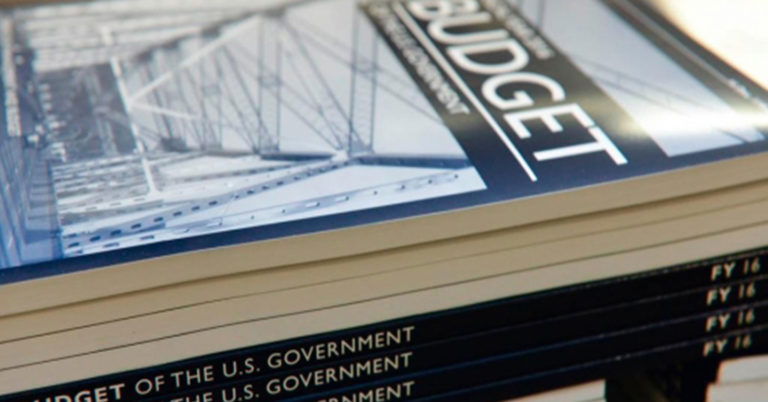
President Donald Trump’s budget and achieving fiscal sustainability
President Donald Trump will release his budget proposal today. But the reforms he’s likely to call for are unlikely to get a hearing in Congress. These annual budget proposals have become largely ceremonial in a broken budget process.
Washington has a spending problem that it hasn’t been able to kick for decades. But the reality is that America is on an unsustainable and unaffordable fiscal path that, if ignored, will result in a diminished future for our children and grandchildren. Many of the programs relied on by the most vulnerable among us will be jeopardized.
Trump’s budget proposal is expected to call for $4.8 trillion in spending in 2021, with an annual deficit that will near $1 trillion. It calls for reforms and cuts to a wide variety of federal programs and agencies that, if implemented, would reportedly reduce the annual deficit to $261 billion by 2030 and balance the U.S. budget within 15 years. These calculations assume an aggressive rate of sustained economic growth, at 3% annually over the next decade.
Leaders in both parties need to be honest with themselves and the American people and commit to a vision of restoring our nation’s financial foundations.
Where to start?
End pervasive cronyism and empower states to problem-solve
Americans increasingly believe the U.S. economy is rigged in a way that prevents them from achieving their unique American dreams. If Congress’s handouts are any indication, they aren’t entirely wrong. Armies of lobbyists swarm Capitol Hill on a daily basis seeking special treatment for their companies and industries.
While direct corporate handouts comprise a small percentage of total federal spending, they have the effect of distorting votes—greasing the skids for enormous spending bills. They also create a culture of distrust of government and business among the general public. Congress would be wise to stop playing favorites well-connected corporations and restore a culture of equality under the law.
Congress would be equally smart to re-embrace its limitations and empower states to solve problems. It is impossible for even the smartest, most well-intentioned leaders to fully grasp the complexities of Americans’ day-to-day lives across our nation. Congressional attempts at top-down solutions ignore this knowledge gap. Such attempts also ignore the reality that life in Lincoln, Nebraska, is very different than life in Los Angeles.
Instead of piling on new one-size-fits-all programs that treat us all the same, Congress should turn its attention to accomplishing its core constitutional functions, streamlining duplicative and outdated programs, and empowering state and local government to address the needs of citizens.
A transparent budget process with the right incentives
Congress has a complex budget process. It is rarely followed. Instead, politicians in both parties regularly push our nation to the brink of a government shutdown before beginning negotiations in earnest. This is done purposefully. It is easier for elected officials to get what they want out of the budget process against the backdrop of a crisis. But budgeting-by-crisis inevitably drives up the cost of government and leads to significant mission creep.
For proof of this point, one needs to look no further than the two-year budget deal struck by Congress prior to August recess last year and the resulting record $1.4 trillion in discretionary spending approved shortly before Christmas. Neither of these events occurred as part of the regular order.
Congress can fix this broken process. The new Bipartisan Congressional Budget Reform Act — sponsored by Senate Budget Committee Chairman Mike Enzi, with Sen. Sheldon Whitehouse as lead cosponsor — is a great step forward. A strong fiscal rule to rein in our debt and put us on a sustainable budget path would be another.
Ensuring government works for the most vulnerable
In the 1930s, Social Security was created to ensure that retirees without adequate means could satisfy their basic needs. In the 1960s, Medicare was designed to provide seniors with health care coverage. While these programs have seen various reforms over the years, both have become something that many seniors rely on.
There is cause for concern, though. Medicare Part A is due to become insolvent by 2026 — just six short years. Social Security is projected to be insolvent by 2034. This means that both programs will lack sufficient reserves to continue funding full benefits. Politicians have consciously overlooked this looming crisis. It is somewhat understandable given all the fearmongering and false information that is spread anytime someone talks about shoring up the programs, but kicking the can down the road will have catastrophic impact.
Social Security and Medicare are already the biggest drivers of federal spending, and in coming years and decades, with an aging population and fewer young workers, will take up larger and larger percentages of total federal spending. Congress owes it to the most vulnerable senior populations, American workers, and future generations to reform Social Security and Medicare so that they work better for those who most need them and are affordable for the long haul.
Both parties recognize the need for reform, but instead of working together to find solutions, they turn any hint of a path forward into a political attack ad. This needs to stop. Waiting any longer will make developing and implementing solutions that much more difficult.
- For more information on the CBO’s latest outlook, read Alison Acosta Winters’ op-ed in The Hill.
- For more information on how the administration should address mandatory spending, check out our report on the spending and debt crisis.
- For more information on the Enzi-Whitehouse Budget Process legislation, check out our policy analysis.

